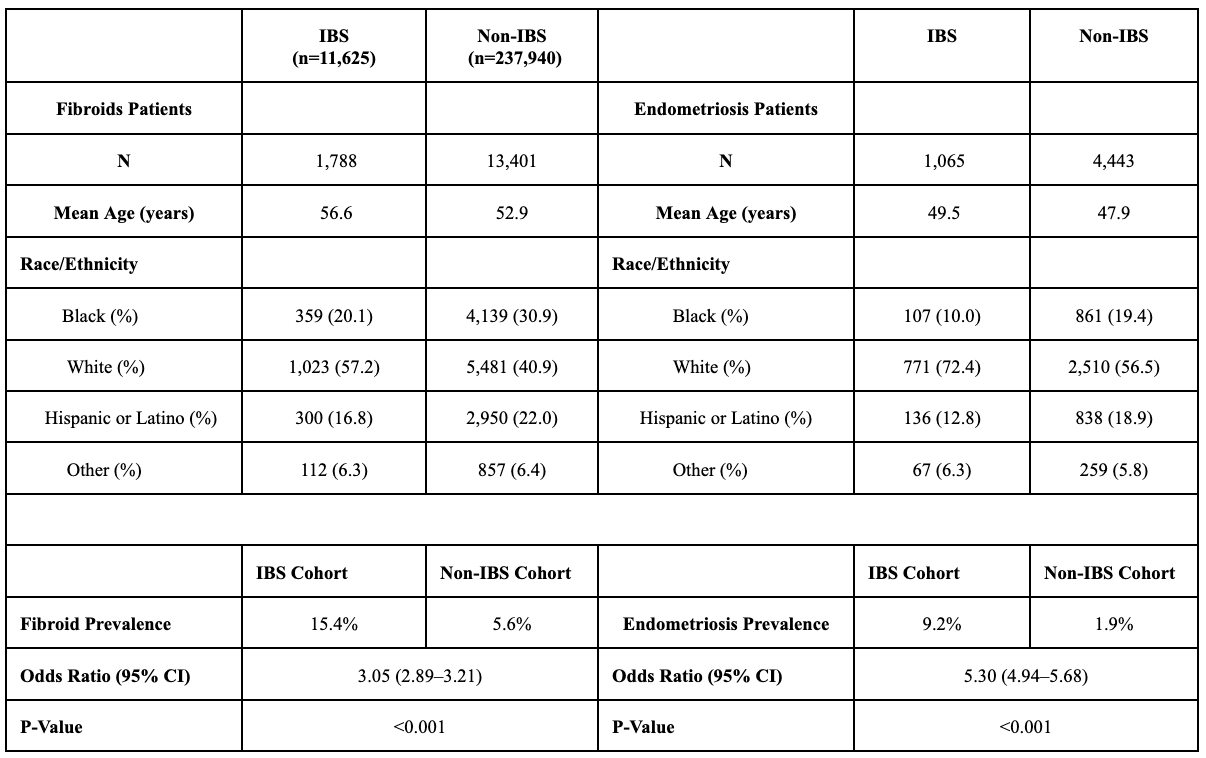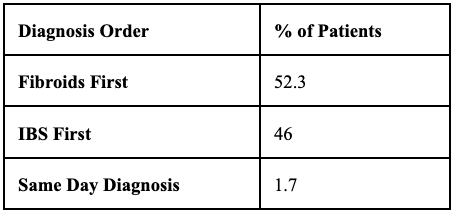Tuesday Poster Session
Category: Functional Bowel Disease
P5081 - Symptom Overlap Between Irritable Bowel Syndrome and Gynecologic Conditions: A Missed Diagnostic Opportunity
Tuesday, October 28, 2025
10:30 AM - 4:00 PM PDT
Location: Exhibit Hall

Kaylah G. Walton, MD, MS (she/her/hers)
University of Chicago Medical Center
Chicago, IL
Presenting Author(s)
Kaylah G. Walton, MD, MS1, William McGonigle, BS2, Ami Panara Shukla, MD3
1University of Chicago Medical Center, Chicago, IL; 2University of Miami Miller School of Medicine, Miami, FL; 3University of Miami Health System, Miami, FL
Introduction: Irritable Bowel Syndrome (IBS) has been diagnosed in approximately 5-7% of the US population, with women disproportionately affected. Its nonspecific gastrointestinal symptoms, such as bloating, abdominal discomfort, and altered bowel habits, overlap with those of gynecologic conditions like fibroids and endometriosis, increasing the risk of a missed diagnosis. While endometriosis has been linked to higher IBS prevalence, the association with fibroids remains underexplored. This study aimed to assess whether women diagnosed with IBS are more likely to carry a concurrent diagnosis of fibroids or endometriosis, to evaluate the potential for missed gynecologic diagnoses in this population.
Methods: We conducted a retrospective, cross-sectional study using data from the NIH All of Us database to compare the prevalence of fibroids and endometriosis in women with and without a diagnosis of IBS. We identified women diagnosed with IBS (n=11,625), fibroids (n=15,189), and endometriosis (n=5,508). Prevalence rates of fibroids and endometriosis were compared between those with and without IBS. Pearson chi-square tests were used to calculate odds ratios and assess statistical significance.
Results: The odds ratio for fibroids in women with IBS versus those without was 3.05 (95% CI: 2.89–3.21, p< 0.001); for endometriosis, the odds ratio was 5.30 (95% CI: 4.94–5.68, p< 0.001). Additionally, we analyzed diagnosis timing to determine whether IBS diagnosis typically precedes fibroids diagnosis and found no significant difference.
Discussion: Our findings reveal a strong association between IBS and gynecologic conditions such as fibroids and endometriosis, raising concern for missed or delayed diagnoses in women presenting with nonspecific GI symptoms. In those with concurrent diagnoses, the data did not suggest that IBS was diagnosed more frequently before fibroids. While overlapping mechanisms like visceral hypersensitivity may explain some comorbidity with endometriosis, this mechanism would not explain the correlation with fibroids. IBS patients accumulate significantly higher healthcare costs and utilization and a misdiagnosis may lead to prolonged symptom burden, unnecessary GI testing, delayed gynecologic treatment, repeated provider visits, ineffective treatment plans and suboptimal patient outcomes. Even as GI guidelines promote a positive diagnosis of IBS, our findings suggest that providers should consider concurrent gynecologic conditions in female IBS patients.

Figure: Demographic Characteristics and Prevalence of Fibroids and Endometriosis Among Women With and Without IBS

Figure: Timing of IBS vs. fibroid diagnosis among women with concurrent diagnoses
Disclosures:
Kaylah Walton indicated no relevant financial relationships.
William McGonigle indicated no relevant financial relationships.
Ami Panara Shukla indicated no relevant financial relationships.
Kaylah G. Walton, MD, MS1, William McGonigle, BS2, Ami Panara Shukla, MD3. P5081 - Symptom Overlap Between Irritable Bowel Syndrome and Gynecologic Conditions: A Missed Diagnostic Opportunity, ACG 2025 Annual Scientific Meeting Abstracts. Phoenix, AZ: American College of Gastroenterology.
1University of Chicago Medical Center, Chicago, IL; 2University of Miami Miller School of Medicine, Miami, FL; 3University of Miami Health System, Miami, FL
Introduction: Irritable Bowel Syndrome (IBS) has been diagnosed in approximately 5-7% of the US population, with women disproportionately affected. Its nonspecific gastrointestinal symptoms, such as bloating, abdominal discomfort, and altered bowel habits, overlap with those of gynecologic conditions like fibroids and endometriosis, increasing the risk of a missed diagnosis. While endometriosis has been linked to higher IBS prevalence, the association with fibroids remains underexplored. This study aimed to assess whether women diagnosed with IBS are more likely to carry a concurrent diagnosis of fibroids or endometriosis, to evaluate the potential for missed gynecologic diagnoses in this population.
Methods: We conducted a retrospective, cross-sectional study using data from the NIH All of Us database to compare the prevalence of fibroids and endometriosis in women with and without a diagnosis of IBS. We identified women diagnosed with IBS (n=11,625), fibroids (n=15,189), and endometriosis (n=5,508). Prevalence rates of fibroids and endometriosis were compared between those with and without IBS. Pearson chi-square tests were used to calculate odds ratios and assess statistical significance.
Results: The odds ratio for fibroids in women with IBS versus those without was 3.05 (95% CI: 2.89–3.21, p< 0.001); for endometriosis, the odds ratio was 5.30 (95% CI: 4.94–5.68, p< 0.001). Additionally, we analyzed diagnosis timing to determine whether IBS diagnosis typically precedes fibroids diagnosis and found no significant difference.
Discussion: Our findings reveal a strong association between IBS and gynecologic conditions such as fibroids and endometriosis, raising concern for missed or delayed diagnoses in women presenting with nonspecific GI symptoms. In those with concurrent diagnoses, the data did not suggest that IBS was diagnosed more frequently before fibroids. While overlapping mechanisms like visceral hypersensitivity may explain some comorbidity with endometriosis, this mechanism would not explain the correlation with fibroids. IBS patients accumulate significantly higher healthcare costs and utilization and a misdiagnosis may lead to prolonged symptom burden, unnecessary GI testing, delayed gynecologic treatment, repeated provider visits, ineffective treatment plans and suboptimal patient outcomes. Even as GI guidelines promote a positive diagnosis of IBS, our findings suggest that providers should consider concurrent gynecologic conditions in female IBS patients.

Figure: Demographic Characteristics and Prevalence of Fibroids and Endometriosis Among Women With and Without IBS

Figure: Timing of IBS vs. fibroid diagnosis among women with concurrent diagnoses
Disclosures:
Kaylah Walton indicated no relevant financial relationships.
William McGonigle indicated no relevant financial relationships.
Ami Panara Shukla indicated no relevant financial relationships.
Kaylah G. Walton, MD, MS1, William McGonigle, BS2, Ami Panara Shukla, MD3. P5081 - Symptom Overlap Between Irritable Bowel Syndrome and Gynecologic Conditions: A Missed Diagnostic Opportunity, ACG 2025 Annual Scientific Meeting Abstracts. Phoenix, AZ: American College of Gastroenterology.


